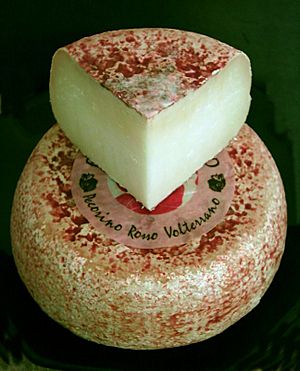Pecorino toscano facts for kids
Quick facts for kids Pecorino toscano |
|
|---|---|

Pecorino toscano from the Volterra area
|
|
| Country of origin | Italy |
| Region | Tuscany |
| Source of milk | Sheep milk |
| Pasteurised | Yes |
| Certification | DOP 1996 |
| Named after | Lua error in Module:Wikidata at line 70: attempt to index field 'wikibase' (a nil value). |
Pecorino toscano is a special type of cheese from Tuscany, a beautiful region in Italy. It's made from the milk of sheep and has a firm texture. Since 1996, it has had a special "Protected Designation of Origin" (PDO) status. This means only cheese made in a certain way and in a specific area can be called Pecorino Toscano.
Contents
The History of Pecorino Toscano
This cheese has a very long history! A famous Roman writer named Pliny the Elder wrote about how cheese like Pecorino Toscano was made a long, long time ago. He described the steps in his big book, Naturalis Historia. He called this cheese Lunense, which likely came from the Lunigiana area.
Another old name for this cheese was "marzolino." This name comes from the month of March, because that's when people traditionally started making it.
In 1475, a writer named Bartolomeo Platina said that the Etruscan "marzolino" cheese was just as good as Parmesan cheese. He wrote that "marzolino" was made in Etruria (an ancient region in Italy) in March. He also mentioned Parmesan, which was made in May.
Today, you can find this type of pecorino cheese made all over Tuscany. It's also produced in nearby parts of Umbria and Lazio.
How Pecorino Toscano is Made
Pecorino Toscano is made from fresh, pasteurised sheep's milk. Many cheese makers on farms produce it.
In 1997, a group of Italian dairy producers estimated that about 5,060 metric tons of Pecorino Toscano were made each year. This makes it the third most produced sheep's cheese in Italy! The two sheep's cheeses made more often are Pecorino Romano and pecorino sardo.
What Pecorino Toscano Looks Like
This cheese can be ready to eat after just 20 days of aging. This is when it's young and has a delicate flavor. However, it's often known as a "hard cheese." To get this harder texture, the cheese needs to age for at least four months. When it's hard, it's great for grating.
Pecorino Toscano usually looks like a slightly flattened ball. It's typically about 15 to 22 centimeters (6 to 9 inches) wide. It stands about 7 to 11 centimeters (3 to 4 inches) tall. Each cheese usually weighs between 0.75 and 3.50 kilograms (1.65 to 7.7 pounds).
The outside of the cheese, called the rind, is usually yellow. But its color can change a lot! This depends on how the cheese is washed while it's aging. Sometimes, people use a mix of crushed tomatoes, ash, or olive oil to wash the rind.
How to Enjoy Pecorino Toscano
There are many ways to enjoy Pecorino Toscano cheese. How you eat it can depend on local traditions and the time of year.
When the cheese is young, it has a mild and delicate taste. This makes it a perfect addition to salads or as a starter.
As the cheese gets older, its flavor becomes stronger. When it's more mature, you can eat it with honey or jam. It also tastes great with fresh vegetables or fruits, especially pears and figs.
Very well-aged Pecorino Toscano is often used in Italy as a substitute for Parmesan. People grate it over many different dishes, like pastas or soups, to add a delicious cheesy flavor.
See also
 In Spanish: Pecorino Toscano para niños
In Spanish: Pecorino Toscano para niños
 | Georgia Louise Harris Brown |
 | Julian Abele |
 | Norma Merrick Sklarek |
 | William Sidney Pittman |

